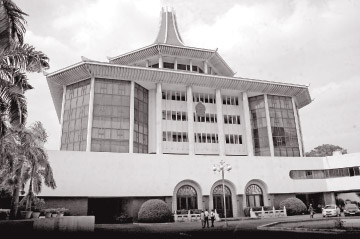|
POINT OF VIEW
On interpreting a Bill :
AMENDMENT or NATIONAL POLICY?
Neville Ladduwahetty
 It is reported that the government has plans to introduce two
revisions to existing provisions of the Constitution. Both relate to the
13th Amendment. The first relates to the merger of “two or three
adjoining Provinces to form one administrative unit” - as in Article
154A (3). The second relates to provisions of Article 154G (2) and (3)
where a special Parliamentary majority of 2/3 is required if “one or
more Councils do not agree” to a Bill. It is reported that the government has plans to introduce two
revisions to existing provisions of the Constitution. Both relate to the
13th Amendment. The first relates to the merger of “two or three
adjoining Provinces to form one administrative unit” - as in Article
154A (3). The second relates to provisions of Article 154G (2) and (3)
where a special Parliamentary majority of 2/3 is required if “one or
more Councils do not agree” to a Bill.
Both contemplated revisions are being considered as Amendments. A
pertinent question that could be raised is why both revisions could not
be categorized as issues that affect “National Policy” as provided for
in the Reserved List rather than as Amendments? Since the first issue
has a bearing on the territorial integrity of Sri Lanka, as in the case
of the merger of the Northern and Eastern Provinces, could not the
revision be treated as coming within the jurisdiction in the Reserved
List of the 13th Amendment (meaning powers of the Central Government),
specified as “National Policy on all Subjects and Functions”? Similarly,
should not the requirement of a 2/3 majority of Parliament be waived if
one or more Councils do not agree to a Bill as a matter of “National
Policy on all Subjects and Function” in the Reserved List, since any
Bill however progressive, such as devolving power to grass roots levels,
as an Amendment would need to be postponed until a 2/3 Parliamentary
majority could be mustered?
13th Amendment - Reserved List
The Reserved List states at its very outset that the Central
Government is responsible for: “National Policy on all Subjects and
Functions”. The reaction to the above provision is reflected in the
observation given below from a publication of the International Centre
for Ethnic Studies, cited by late H.L.de Silva in his book, SRI LANKA A
NATION IN CONFLICT, 2008, pp.125,126).
 “The 13th Amendment in the present form is the anathema (sic) of
sincerity in that powers which are ostensibly devolved can be reacquired
by the Centre by the use of disingenuous mechanism, such as a
description of anything under the sun as a matter in respect of which
the formulation of a national policy is required. It is all-embracing in
its conception. Now that kind of sleight-of-hand, that kind of
disingenuity is not likely to inspire confidence in anybody. Education
is a devolved subject, but by characterizing a school as a national
school (and there are no criteria that governs the delineation) next
morning it is handed over to Colombo…” (ICES, 1995, 9). “The 13th Amendment in the present form is the anathema (sic) of
sincerity in that powers which are ostensibly devolved can be reacquired
by the Centre by the use of disingenuous mechanism, such as a
description of anything under the sun as a matter in respect of which
the formulation of a national policy is required. It is all-embracing in
its conception. Now that kind of sleight-of-hand, that kind of
disingenuity is not likely to inspire confidence in anybody. Education
is a devolved subject, but by characterizing a school as a national
school (and there are no criteria that governs the delineation) next
morning it is handed over to Colombo…” (ICES, 1995, 9).
The above comment conveys the impression that devolved powers are
sacrosanct. It fails to recognize that in a unitary state such as Sri
Lanka, devolved powers are subordinate to the powers at the centre. The
four Judges who determined that a referendum was not needed quoted Dr.
Wheare from his book on “Modern Constitution” (p.19).
The quote was: “In a unitary Constitution, on the other hand, the
Legislature of the whole country is the Supreme Law-making body in the
country. It may permit other Legislatures to exist and to exercise their
powers, but has the right, in law, to overrule them; they are
subordinate to it”.
Continuing the judgement written by the then Chief Justice S.
Sharvananda stated:
“The question that arises is whether the 13th Amendment Bill under
consideration creates institutions of government which are supreme,
independent and not subordinate within their defined spheres.
Application of this test demonstrates that both in respect of the
exercise of its legislative powers and in respect of exercise of
executive powers no exclusive or independent power is vested in the
Provincial Councils. The Parliament and President have ultimate control
over them and remain supreme”.
Therefore clearly, devolved powers are subordinate to “National
Policy on all Subjects and Functions”.
Provisions in the US constitution
Despite the negativity expressed in the ICES publication, the irony
is that similar provisions exist in the US Constitution. For instance,
Article 1 Section 8 Clause 18 states:
“To make all Laws which shall be necessary and proper for carrying
into Execution the foregoing Powers, and all other Powers vested by this
Constitution of the Government of the United States, or in any
Department or Office thereof”.
Under this provision, often described as “Necessary and Proper
Clause”, given below are a few of the instances where this clause was
used to enact a wide variety of federal laws.
 |
|
Supreme
Court complex |
1. Various reforms involved in the New Deal to regulate interstate
commerce.
2. A federal statute making it a crime for a farmer to produce more
wheat than was allowed under price and production control even if the
excess production was for the farmers own use.
3. Federal laws affecting economic activity
4. A wide range of criminal laws relating to interference with the
federal government’s rightful operation.
The need for Article 1 Section 8 Clause 18 was strongly defended by
Hamilton and Madison in the Federalist Papers as a measure needed for
the security, integrity and progress of the United States.
The need for National Policy
In this context it is pertinent to question whether the recently
passed Divi Neguma Bill that was treated as an amendment should instead
to have been treated as a Bill under the provision of “National Policy”
in the Reserved List since its primary purpose was to address a national
issue, namely, poverty alleviation. Had it been determined that the Bill
was in fact part of National Policy it may not have been necessary to
endure the trauma associated with it.
Similarly, current provisions for the merger of two or three
provinces should be repealed in order to ensure that no future
government would be tempted to use the provision to stay in power
through coalition demands. For instance, a political party that fails to
secure a majority to form a government could bargain for the support of
minority parties in exchange for the merger of the Northern and Eastern
Provinces and transform itself into a viable government with a majority.
Likewise, the need for a unanimous agreement by Provincial Councils is
an unnecessarily high bar that could stand in the way of progressive
legislation.
Therefore, there is a need to treat these Bills as coming under the
rubric of “National Policy” instead of as Amendments.
Role of the Supreme Court
Since the issue of whether a Bill is an Amendment or one of National
Policy is a question of law, any government should seek the opinion of
the Supreme Court as to its categorization under provisions of Article
129 of Sri Lanka’s Constitution. Such an approach would clarify once and
for all how a Bill is categorized. Since Article 129 provides for
proceedings to be publicly held, the opinion conveyed by the Court would
be final, thereby paving the way for a government to proceed with
confidence.
The same procedure could be adopted in the case of whether the 13th
Amendment should be amended or repealed in its entirety. Since there
appears to be general acceptance of the fact that five out of nine
Judges of the Supreme Court determined in 1987 that a referendum was
required, a fact that was first brought to the attention of the public
in September 2009 in an article titled “Legality/Constitutionality of
13A may be questionable”, it would be legitimate for the government to
seek an opinion from the Supreme Court as to how the 13th Amendment came
to adopted without a referendum despite the Court’s determination.
This legitimacy of this approach would eliminate current debate as to
whether to amend or repeal the 13th Amendment, and lay to rest this all
consuming issue for the government and the nation.
Both internationally and nationally, pressure is being exerted on the
government not to touch the 13th Amendment. Despite this pressure, an
objective evaluation would reveal that problems exist with regards to
provisions such as:
1. Opportunity for the merger of provinces;
2. Inability to introduce legislation without a 2/3 majority if one
or more Councils are opposed notwithstanding however progressive the
legislation may be;
3. Provincial Police and Land Powers as presently provided for in the
13th Amendment warrant revisions.
The inability of the government to move forward on any of these issue
is because it perceives them as Amendments requiring 2/3 majorities
instead of them being recognized as vital and essential components of
National Policy.
The government should be sobered by the fact that under the
Constitutional provisions of the Reserved List, it has power to
legislate on “National Policy on all Subjects and Functions”.
The government should have the courage to use this provision to
legislate on issues that are unquestionably issues of National
importance, encouraged by the fact that similar provisions exist in the
US Constitution, and furthermore, by the fact that it was the unbridled
use of this provision that enabled the US, although a federal state, to
strengthen the centre and to develop and prosper in a manner that has
been unparalleled. |





